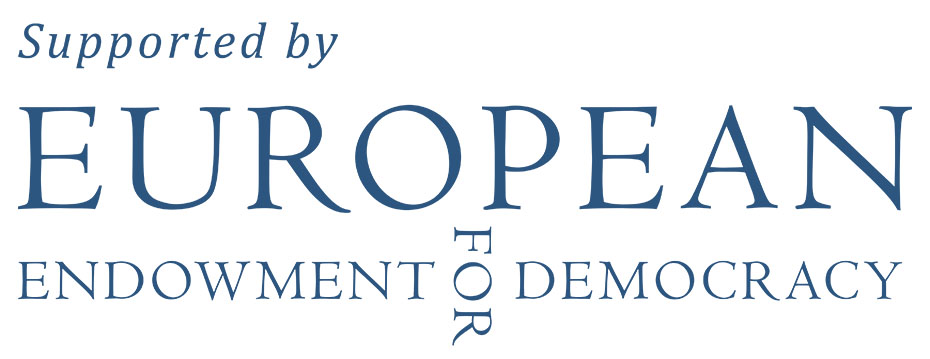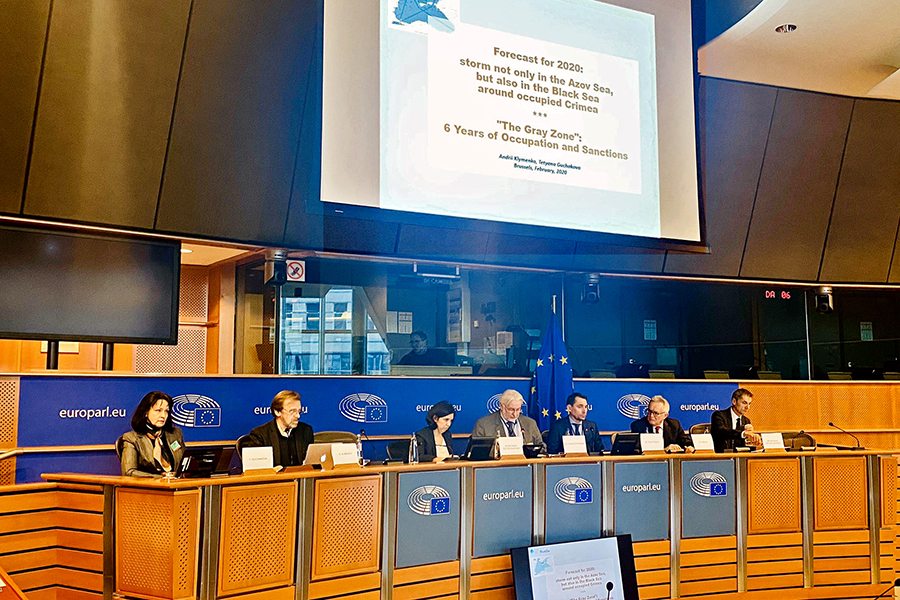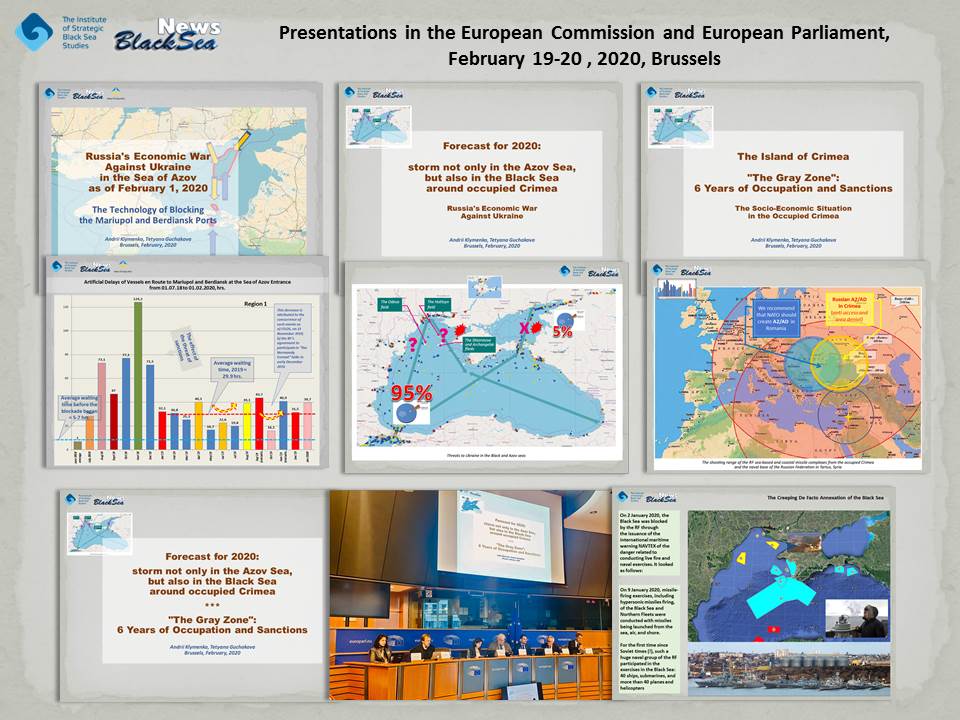The policy of non-recognition of the attempt to annex the Crimean peninsula
Andrii KLYMENKO, Tetyana GUCHAKOVA
The Monitoring group of the Institute for Black Sea Strategic Studies and BlackSeaNews
with creative participation of
Boris BABYN, Bohdan USTYMENKO, Vitaliy MARTYNYUK
and other participants in the Maritime Expert Platform
The Monitoring group of the Institute for Black Sea Strategic Studies, the Maidan of Foreign Affairs and BlackSeaNews are glad to share with you the proposals that we made in Brussels in the European Parliament and European External Action Service on February 19-20, 2020.
The policy of non-recognition of the attempt to annex
the Crimean peninsula
Non-recognition of the attempt to annex the Crimean peninsula is the obligation of the subjects of international law rather than their right. This obligation is based not only on the “Crimean” UN Resolutions (*) but also on fundamental international custom. The obligation not to recognise the annexation attempt arises from the international custom concentrated in the ancient Roman maxim ex injuria jus non oritur - "right does not arise from injustice".
(*) Resolution adopted by the General Assembly on 27 March 2014 – 68/262. Territorial integrity of Ukraine, https://www.un.org/en/ga/search/view_doc.asp?symbol=A/RES/68/262
At the level of conventions, the obligation of non-recognition is a logical extension of the principle of non-use of force and threat of force, enshrined in the UN Charter and interpreted in the Declaration on Principles of International Law of 1970, on Definition of Aggression of 1974, etc.
Non-recognition is universal and covers all areas of interaction of third countries with the Russian Federation, Ukraine - from the control of the proliferation of nuclear weapons to children's sports competitions.
This obligation is minimal and constant - that is, it cannot cease on its own and is a form of response, less than which even a politically friendly to the RF state cannot afford.
The policy of non-recognition of the annexation of Crimea should be implemented, among other things, through the adoption of decisions by international organisations and individual countries (at least by those that supported the UN General Assembly Resolution 68/262 of 27.03.2014), which contain the following provisions, the list of which is not exhaustive:
prohibition of direct or indirect recognition of the annexation attempt in any documents or actions (including visits to Crimea or work in Crimea under the conditions of the Russian Federation) for:
- international organizations,
- supreme state bodies, regional and municipal authorities and officials of third countries, including their diplomats and consuls in the Russian Federation
- any administrative or judicial practice in specific cases (passports, visas, educational or commercial documents, contracts, etc.)
- institutions of science, culture, sports or education
- any financial transactions, electrical and electronic communications, rail, air and sea transport activity
- any “people’s diplomacy”, media, publications, reports, teaching and other means of disseminating information;
prohibiting publication and any kind of presentation of geographical and navigation maps, showing the Crimean Peninsula as “part” of the Russian Federation;
prohibiting the travel businesses, including those providing online booking, logistical, and insurance services, from cooperating with Crimea-based tourist facilities (such as hotels, museums) and travel agencies, directly or through partners, including listing such facilities and / or routes on their online platforms;
prohibiting organisers of international scientific, educational, tourist, sports, cultural, and business events; exhibitions, festivals, advertising campaigns, and other events from granting permission to place, present, or publish information that would point to the Crimean Peninsula’s "belonging" to the Russian Federation; and also prohibiting them from involving people, who reside in the occupied territory of the Autonomous Republic of Crimea and the city of Sevastopol and work in the government, local governments, and other organisations officially registered in the occupied territory under the laws of the Russian Federation, as participants in such events;
prohibiting politicians, civil servants, and other public figures from entering the Crimean Peninsula from the territory of Russia;
strong recommendations for citizens of the respective states not to enter the Crimean Peninsula from the territory of Russia, with a warning about responsibility for such actions according to the Ukrainian legislation;
prohibiting the issuance of any entry visas to: 1) holders of Russian passports issued in Crimea; 2) citizens of the Russian Federation who have their place of residence registration in Crimea;
prohibiting the presence in the territory of the Crimean Peninsula of any national brands (such as industrial, commercial, service). Franchise agreements with any business entity of the Russian Federation should include a standard clause on the prohibition of work in Crimea and heavy fines in case of violation of this condition;
prohibiting the sale (resale) in the territory of the Crimean Peninsula of any goods and services supplied under contracts to the territory of the Russian Federation. Such agreements with any business entity of the Russian Federation should include a standard clause prohibiting the movement or resale of goods or services to Crimea and heavy fines in case of violations;
prohibiting servicing direct voyages between the ports of the respective countries and the ports of the Crimean Peninsula; verifying the authenticity of ship’s documents on the port of arrival/ departure.
* * *
The monitoring of violations of international sanctions against Russia and legal regime
of the Crimean temporarily occupied territory is supported by the European program initiative
of the International Renaissance Foundation.
The views of the authors do not necessarily reflect the position
of the International Renaissance Foundation.
* * *
 This publication has been produced with the support of the European Endowment for Democracy (EED). Its contents do not necessarily reflect the official opinion of EED. Responsibility for the information and views expressed in this publication lies entirely with the authors.
This publication has been produced with the support of the European Endowment for Democracy (EED). Its contents do not necessarily reflect the official opinion of EED. Responsibility for the information and views expressed in this publication lies entirely with the authors.
More on the topic
- 01.07.2021 The Electronic Catalogue Research by Western Think Tanks on Crimea and the Situation in the Black Sea
- 22.01.2021 How the Sanctions Work. The Defense Industry of the Occupied Crimea
- 11.06.2020 The Maritime Expert Platform Association on Urgent Actions to De-Occupy Crimea and Counter the Occupation of the Sea of Azov and the Black Sea. Proposals
- 06.06.2020 The Real Impact of Crimean Sanctions (10-11). The Cost of the Occupation to Russia and What Awaits Crimea and Sevastopol
- 06.06.2020 The Real Impact of Crimean Sanctions (9). The Updated "Crimean Sanctions Package"
- 20.05.2020 The Real Impact of Crimean Sanctions (6-8). The Peculiarities of Economic Processes in Russia and Occupied Crimea under Sanctions
- 18.05.2020 The Real Impact of Crimean Sanctions (5): the Imposition of U.S. Sanctions against Russian Plants over the Production of Warships in Crimea
- 09.05.2020 The Real Impact of Crimean Sanctions (4). Missed Deadlines for the Production of Karakurt Missile Corvettes at the Morye Shipyard in Feodosia
- 07.05.2020 The Impact of Sanctions on Maritime Connections with the Occupied Crimean Peninsula (3)
- 05.05.2020 The Real Impact of Crimean Sanctions (2). The Impact of Sanctions on the Crimean Banking
- 04.05.2020 The Real Impact of Crimean Sanctions (1). The State of the Sanctions Regime as of 1 February 2020
- 13.02.2020 Russia's Economic War Against Ukraine in the Sea of Azov as of February 1, 2020. The Technology of Blocking the Mariupol and Berdiansk Ports

